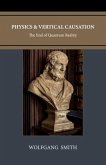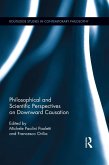Two thousand years ago, Lucretius said that everything is atoms in the void; it's physics all the way down. Contemporary physicalism agrees. But if that's so how can we-how can our thoughts, emotions, our values-make anything happen in the physical world?
This conceptual knot, the mental causation problem, is the core of the mind-body problem, closely connected to the problems of free will, consciousness, and intentionality. Anthony Dardis shows how to unravel the knot. He traces its early appearance in the history of philosophical inquiry, specifically in the work of Plato, Aristotle, Descartes, and T. H. Huxley. He then develops a metaphysical framework for a theory of causation, laws of nature, and the causal relevance of properties. Using this framework, Dardis explains how macro, or higher level, properties can be causally relevant in the same way that microphysical properties are causally relevant: by their relationship with the laws of nature. Smelling an orange, choosing the orange rather than the cheesecake, reaching for the one on the left instead of the one on the right-mental properties such as these take their place alongside the physical "motor of the world" in making things happen.
This conceptual knot, the mental causation problem, is the core of the mind-body problem, closely connected to the problems of free will, consciousness, and intentionality. Anthony Dardis shows how to unravel the knot. He traces its early appearance in the history of philosophical inquiry, specifically in the work of Plato, Aristotle, Descartes, and T. H. Huxley. He then develops a metaphysical framework for a theory of causation, laws of nature, and the causal relevance of properties. Using this framework, Dardis explains how macro, or higher level, properties can be causally relevant in the same way that microphysical properties are causally relevant: by their relationship with the laws of nature. Smelling an orange, choosing the orange rather than the cheesecake, reaching for the one on the left instead of the one on the right-mental properties such as these take their place alongside the physical "motor of the world" in making things happen.
Dieser Download kann aus rechtlichen Gründen nur mit Rechnungsadresse in A, D ausgeliefert werden.









